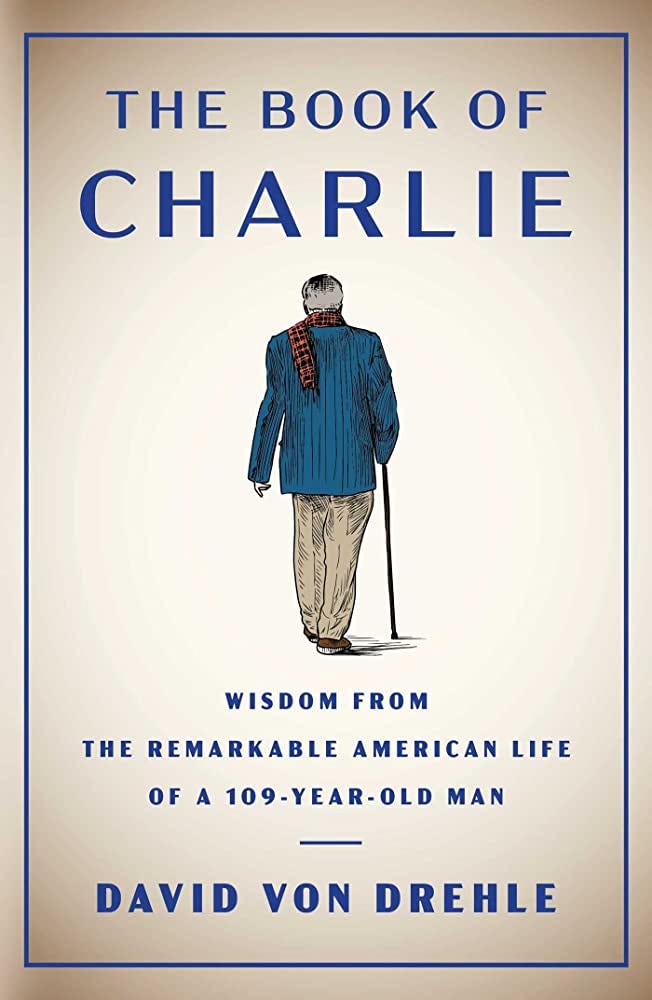Of all the pieces I have read in the last month or so, none has touched me as much as this piece from the remarkable writer and reporter David Von Drehle (now an editor at The Washington Post) about his neighbor.
Since reading the story on Monday, I’ve shared it with a dozen friends and talked to another dozen or so about it.
There is just some wisdom that only time can impart (my oldest child says I remind him of this all the time), and Charlie had a lot of time. Von Drehle notes, “By the time he was done, he had lived nearly half the history of the United States.” (Just let that soak in for a minute… to appreciate how much change can occur in one person’s lifetime.)
Charlie lived much of his life from a place of Stoic principles—a philosophy that feels so foreign and needed in our contemporary culture.
Stoicism is grounded in the idea that we don’t control most of what happens to us in our lives. Yet, we can control how we respond (this can also be defined as having a strong inner locus of control — which is a great indicator of mental health… and is a mental health indicator currently on the decline, particularly in young people).
Essentially Stoicism is the idea that everything that happens to us is an opportunity to cultivate a better version of ourselves—or put another way, “the obstacle is the way.”
Viktor Frankl, the author of “Man’s Search for Meaning,” a text that describes Frankl’s experience in a Nazi concentration camp during WWII, articulates the principles of Stoicism (a philosophy he credits with his survival) this way, “Everything can be taken from a man but one thing: the last of the human freedoms — to choose one’s attitude in any given set of circumstances, to choose one’s own way” of meeting what life presents.”
Here is Von Drehle, in describing Charlie’s Stocisism:
Let it go and Hold on! — in the way of so many great philosophies, those apparent opposites prove to be two sides of the same coin. To hold securely to the well-formed purposes of your will, you must let go of the vain idea that you can control people or events or the tides of fate. But you can choose what you stand for and what you will try to accomplish.
You can choose, when hopes and fears are swirling in your head, to clutch at hope. Amid beauty and ugliness, to fasten on beauty. Between despair and possibility, to pursue the possible. Of love and hate, to opt for love.
These are choices, entirely in our power to make. Charlie showed me how.
Charlie also reminded Von Drehle about the importance of learning from our mistakes, “Mistakes can have virtue, Charlie knew. They show we’re making the effort, engaging with life, “in the arena,” as Theodore Roosevelt put it. Or as Epictetus, that marvelous Stoic, said: “If you want to improve, be content to be thought foolish and stupid.”
This attitude toward learning from our mistakes brings to mind the German psychoanalyst Karen Horney (September 16, 1885–December 4, 1952), who wrote about her own life as it drew to its end in Neurosis and Human Growth: The Struggle Toward Self-Realization.
Maria Popova introduces Horney’s work this way:
“The measure of growth is not how much we have changed, but how harmoniously we have integrated our changes with all the selves we have been — those vessels of personhood stacked within the current self like Russian nesting dolls, not to be outgrown but to be tenderly incorporated. True growth is immensely difficult precisely because it requires befriending the parts of ourselves we have rejected or forgotten — what James Baldwin so memorably called “the doom and glory of knowing who you are and what you are”; it requires shedding all the inauthentic personae we have put on in the course of life under the forces of convention and compulsion; it requires living amicably with who we have been in order to fully live into who we can be.”
In the end, Von Drehle leaves us with some inspired words for living via Charlie, who wrote down his most important lessons from a long-lived life. Here are his notes:
Think freely. Practice patience. Smile often. Forgive and seek forgiveness.
Feel deeply. Tell loved ones how you feel.
Be soft sometimes. Cry when you need to. Observe miracles.
So the next time life serves you a curveball—remember the Stoics, and remember Charlie—as you nest that previous version of yourself inside the new shell and grow into a person who is a little stronger, a little wiser, and a little more humbled by all that life has to offer.
Have a great weekend,
Erin

The Proximity Principle
*Author’s Note: If you frequently follow this space, you may have noted that this edition of the Missives is coming out a few days late. I’ve been on the road with my wife and daughter this past week, exploring the Michigan sand dunes, and our reentry to the real world has been back-to-back with events and baseball games. But all those adventures inspir…
Lessons from Lasso
I hadn’t heard of a “holy fool” before my conversation with the excellent author Belden Lane a few weeks back. As a theological scholar, Lane is always on the path to engaging with the holy, and his willingness to be foolish and playful is a way to enter that state of being.





